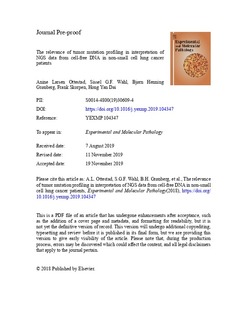| dc.contributor.author | Ottestad, Anine Larsen | |
| dc.contributor.author | Wahl, Sissel Gyrid Freim | |
| dc.contributor.author | Grønberg, Bjørn Henning | |
| dc.contributor.author | Skorpen, Frank | |
| dc.contributor.author | Dai, Hong Yan | |
| dc.date.accessioned | 2019-11-25T11:39:30Z | |
| dc.date.available | 2019-11-25T11:39:30Z | |
| dc.date.created | 2019-11-22T16:48:42Z | |
| dc.date.issued | 2019 | |
| dc.identifier.issn | 0014-4800 | |
| dc.identifier.uri | http://hdl.handle.net/11250/2630251 | |
| dc.description.abstract | Studies have indicated that detection of circulating tumor DNA (ctDNA) prior to treatment is a negative prognostic marker in non-small cell lung cancer (NSCLC). ctDNA is currently identified by detection of tumor mutations. Commercial next-generation sequencing (NGS) assays for mutation analysis of ctDNA for routine practice usually include small gene panels and are not suitable for general mutation analysis. In this study, we investigated whether mutation analysis of cfDNA could be performed using a commercially available comprehensive NGS gene panel and bioinformatics workflow. Tumor DNA, plasma DNA and peripheral blood leukocyte DNA from 30 NSCLC patients were sequenced. In two patients (7%), tumor mutations in cfDNA were immediately called by the bioinformatic workflow. In 13 patients (43%), tumor mutations were not called, but were present in ctDNA and were identified based on the known tumor mutation profile. In the remaining 15 patients (50%), no concordant mutations were detected. In conclusion, we were able to identify tumor mutations in ctDNA from 57% of NSCLC patients using a comprehensive gene panel. We demonstrated that sequencing paired tumor DNA was helpful to interpret data and confirm ctDNA, and thus increased the ratio of patients with detectable ctDNA. This approach might be feasible for mutation analysis of ctDNA in routine diagnostic practice, especially in case of suboptimal plasma quality and quantity. | nb_NO |
| dc.description.abstract | The relevance of tumor mutation profiling in interpretation of NGS data from cell-free DNA in non-small cell lung cancer patients | nb_NO |
| dc.language.iso | eng | nb_NO |
| dc.publisher | Elsevier | nb_NO |
| dc.rights | Attribution-NonCommercial-NoDerivatives 4.0 Internasjonal | * |
| dc.rights.uri | http://creativecommons.org/licenses/by-nc-nd/4.0/deed.no | * |
| dc.title | The relevance of tumor mutation profiling in interpretation of NGS data from cell-free DNA in non-small cell lung cancer patients | nb_NO |
| dc.type | Journal article | nb_NO |
| dc.type | Peer reviewed | nb_NO |
| dc.description.version | acceptedVersion | nb_NO |
| dc.source.journal | Experimental and molecular pathology (Print) | nb_NO |
| dc.identifier.doi | https://doi.org/10.1016/j.yexmp.2019.104347 | |
| dc.identifier.cristin | 1751238 | |
| dc.description.localcode | © 2019. This is the authors’ accepted and refereed manuscript to the article. Locked until 21.11.2021 due to copyright restrictions. This manuscript version is made available under the CC-BY-NC-ND 4.0 license http://creativecommons.org/licenses/by-nc-nd/4.0/ | nb_NO |
| cristin.unitcode | 194,65,15,0 | |
| cristin.unitname | Institutt for klinisk og molekylær medisin | |
| cristin.ispublished | false | |
| cristin.fulltext | postprint | |
| cristin.qualitycode | 1 | |

